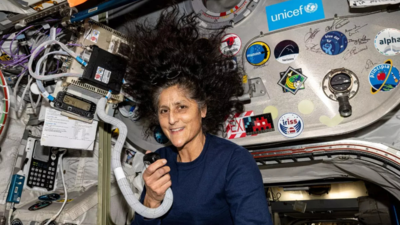- News
- lifestyle
- health-fitness
- health-news
- Stuck in Space for 6 Months: How is Sunita Williams staying physically and mentally healthy beyond Earth
Trending
Stuck in Space for 6 Months: How is Sunita Williams staying physically and mentally healthy beyond Earth
Two NASA astronauts face an extended stay aboard the ISS. Their Boeing Starliner encountered problems. A SpaceX rescue mission is scheduled for 2025. The astronauts' health and well-being are being monitored. NASA ensures adequate supplies and psychological support. The crew awaits their return to Earth.

The Starliner experienced propulsion system issues and helium leaks. An empty Starliner returned to Earth earlier this month due to safety concerns. A SpaceX capsule launched in October to retrieve the astronauts, but their return is not scheduled until next year. Until a SpaceX Dragon ship arrives to get them in February 2025, the crew will have to stay at the space station, which is located 254 miles above Earth.

Concerns arose about the astronauts' well-being during this extended stay, especially regarding food and oxygen. NASA assures the public that the ISS has ample supplies. “The space station is well-stocked with everything the crew needs, including food, water, clothing and oxygen,” NASA stated. Regular resupply missions will continue.
How stranded astronauts are keeping up their physical health
Food supplies are under stress due to the unanticipated extension. Pizza, roast chicken, prawn cocktails, and fresh produce were all on their original menu. They now mostly eat breakfast cereal with powdered milk, reconstituted soup made with water from the station's 530-gallon reservoir, and dehydrated casseroles. In a shocking revelation, the ISS turns crew urine and sweat into drinkable water to maximize efficiency.
NASA also addressed the astronauts' mental health. They stated that they “have a team of doctors, psychologists, and others on the ground dedicated to supporting the health and well-being of astronauts before, during, and after each space mission.” The agency offers psychological support for astronauts and their families. Astronauts also undergo behavioral health training and have communication access to family and friends, along with care packages.
Additionally, NASA ensures that astronauts' mental and emotional health is supported while they are in orbit. According to a statement, the space agency offers crew members and their family psychological support services that are tailored to each mission.
Mental health concerns rise for NASA astronauts
In order to manage their behavioral health, astronauts get intensive training in the use of self-assessment instruments and therapies. In order to prepare each astronaut for missions on critical characteristics including communication, teamwork, leadership, and followership, NASA also offers training in expeditionary skills," the statement continued.
Astronauts can receive crew care packages on NASA's cargo resupply missions, teleconference with a psychologist if necessary, and email, call, and video conference with their loved ones to help keep them motivated and positive while on the space station.
Adnan Sami 2.0: All you need to know about the singer's massive weight loss journey from 220 kg to 65 kg

About the Author
TOI Lifestyle DeskEnd of Article
FOLLOW US ON SOCIAL MEDIA








